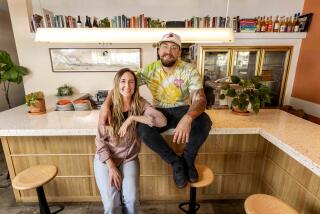Profiles of Newly Hired Boss and Fired Boss : Carl N. Karcher built O.C.-based corporation from a hotdog stand. His demise as chairman is latest in a series of family and financial problems.
- Share via
ANAHEIM — On Friday morning, Carl N. Karcher entered the fast-food company he built from a hotdog stand through a side door, avoiding the main reception lobby of Carl Karcher Enterprises Inc.
Just hours later, the 76-year-old symbol of Carl’s Jr. restaurants was unseated as chairman of the board. Though no longer the leader of the company he founded 52 years ago, Karcher remains on the seven-person board until his term expires next June.
At company headquarters on 1200 N. Harbor Blvd., just down the road from Disneyland, the atmosphere Friday afternoon seemed harried and chaotic, with well-dressed executives scurrying in and out. Karcher’s personal financial adviser Edward Pasquale stood in the lobby making one last call on a remote phone before dashing to his car. No one seemed to know exactly where Karcher was.
“He’s very disappointed and he feels betrayed,” Pasquale said. “This whole fight has gotten out of hand. We tried to solve it by amicable means but were not able to.”
Rosemary Ryan, a corporate receptionist and employee for 16 years, said Karcher came to work Friday morning and entered the building through his own private entrance. But she never saw him leave.
“I haven’t seen him,” said Ryan, who sits directly in front of a large oil portrait of Karcher and his wife, Margaret, which hangs in the lobby. “It’s a very sad day for us. I feel sorry for him.”
When asked if she thought the picture would be removed, Ryan seemed offended.
“I can’t imagine that. He’s still the founder, they can’t change that. None of us would be here but for him,” she said.
Twice on Friday, Karcher visited St. Boniface Catholic Church, the same one in which he was married more than half a century ago. He went there once in the morning and once in the afternoon, said people at the church and at his office. Karcher attends mass every morning, said Father John Lenihan.
“I just don’t want to comment,” Lenihan said. “I want to be there to help.”
On Friday afternoon, at Karcher’s Anaheim home--a large but modest two-story Spanish-style bungalow--the Spanish tile fountain outside the door was flowing and an American flag flew on the front lawn, which faces a palm tree-lined street. An employee who answered the door said that although Karcher’s wife, Margaret, was home she would not comment on the day’s events. He said Karcher was at work.
The avuncular Karcher, recognizable to many for his TV pitchman role touting the Carl’s Jr. chain of 650 restaurants, has been beset by personal as well as business troubles in recent years. The cumulation of these problems was the bitter feud during the past five weeks over who will control the company.
Karcher’s younger brother, Donald, once seen as a successor to Carl, was diagnosed with lung cancer and died last year at the age of 64. Margaret Karcher, the daughter of a local orange grower, underwent cancer surgery in 1991. The location of what was once her family’s orange groves is today the headquarters site of the company. The couple raised 12 children.
Known for his extensive charitable giving, especially to the United Way and to Catholic charities, Karcher’s conservative politics have drawn criticism from women and gay rights activists.
His religious beliefs are intermingled with his business and political activity. Proudly displayed at company headquarters is a large wooden statue of St. Francis of Assisi that Karcher had shipped from Italy. Karcher often hands out little cards imprinted with a prayer from St. Francis along with coupons for burgers and prayers are recited at the beginnings of company meetings, Karcher revealed in a 1991 interview.
An Ohio farm boy, Karcher arrived in Anaheim in 1937 to work at his uncle’s feed store. He later took a job driving a bread truck in South-Central Los Angeles, where he started noticing hotdog stands along his delivery route. Over his wife’s objections, Karcher bought his first hotdog stand in 1941 by getting a loan against the family car. By 1956 he had opened the first Carl’s Jr., a takeout restaurant in Anaheim.
The company was one of the first fast-food chains to deliver food directly to tables, add salad bars and recognize the need for healthier food. The chain grew into a multimillion-dollar empire.
Karcher ends his 1991 life story, “Never Stop Dreaming” this way: “Yes, the American Dream is still alive and well in this great country of ours. I know. I’m living it.”
More to Read
Inside the business of entertainment
The Wide Shot brings you news, analysis and insights on everything from streaming wars to production — and what it all means for the future.
You may occasionally receive promotional content from the Los Angeles Times.










